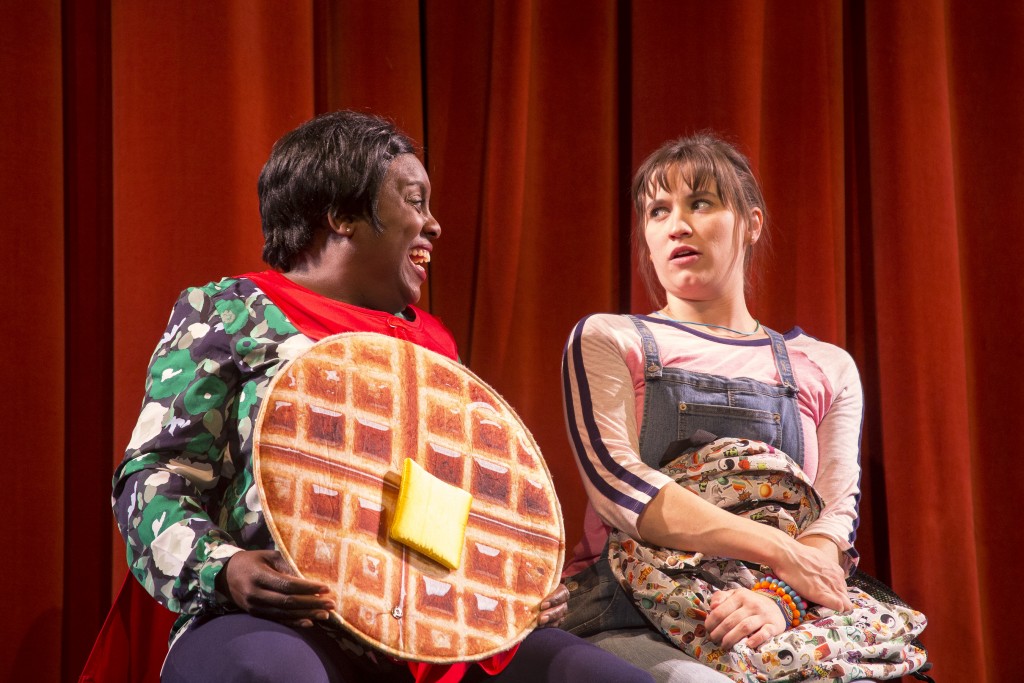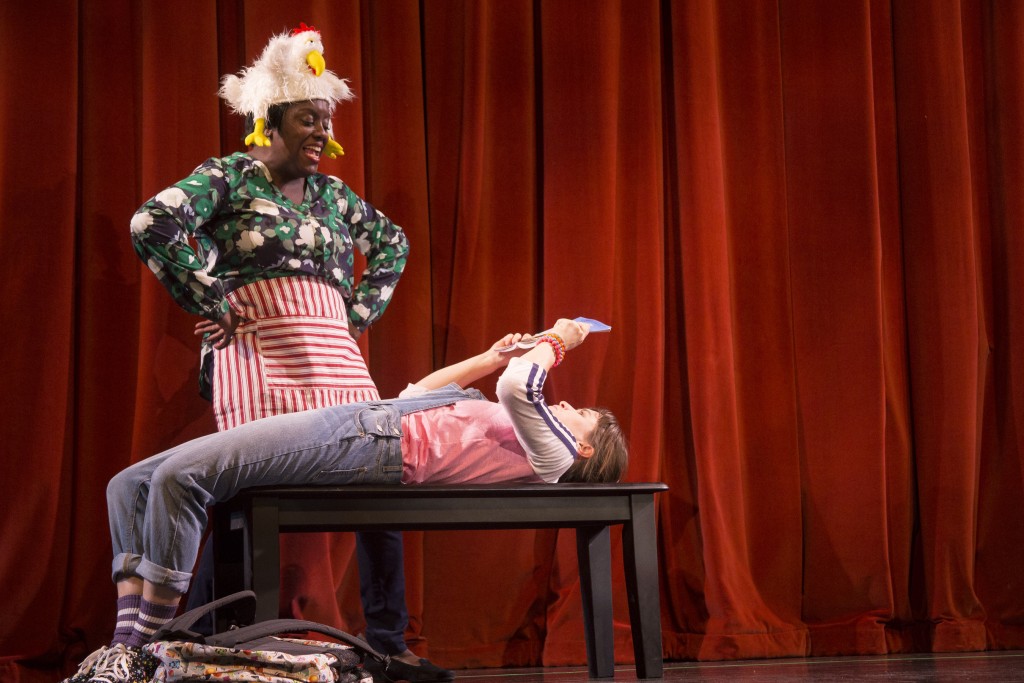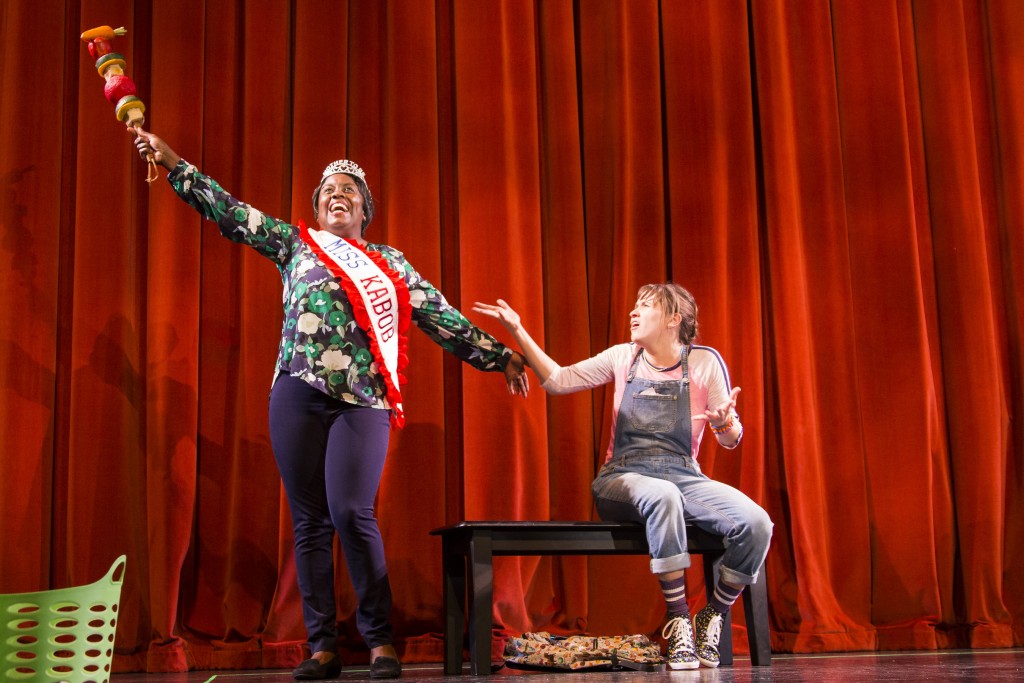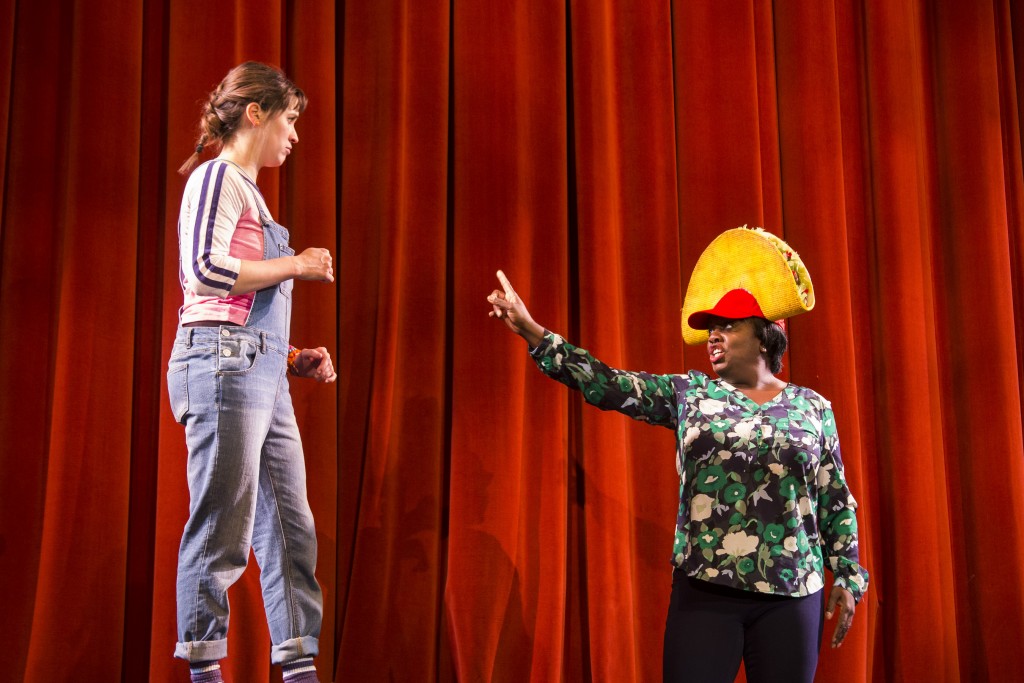Children’s theater – or precisely, solid, artistically satisfying stories told with imaginative theatrical flair for young audiences – is often underappreciated for what it can achieve. Not only does it engage children to begin hopefully a lifelong appreciation of live theater but it also can inspire them to think about their own experiences with the issues that affect their lives and how they begin to see their individual identities develop and mature in a complicated world. One could argue the creative process for making children’s theater artistically rewarding is more difficult than writing and producing plays for older audiences. Children are honest critics, perhaps even brutally so, about shows aimed toward them.

A premiere production of Melissa Leilani Larson’s The Edible Complex, the fourth annual installment in Plan-B Theatre’s Free Elementary School Tour (FEST), excels at every challenge of making good children’s theater. Directed by Cheryl Ann Cluff, the production marvelously sparks the imagination of children while leveraging so impressively the minimalism that Plan-B consistently masters. Larson’s story, which explores the topic of body image aimed at children in grades 4-6, centers around Anna, a 10-year-old child who is talented in the kitchen and aspires to be a chef. However, after her mother passes on having a sandwich the girl is planning to make, Anna wonders if she is dissatisfied with her own body image and is confused about how that would reconcile her dream to become a successful, famous chef.
Actors Anne Louise Brings and Dee-Dee Darby-Duffin animate Larson’s script with much delight as the girl and mother, respectively. Keeping young and older members of the audience riveted to the action on stage, Darby-Duffin acts out in fine comedic form a spectrum of delicious foods that pop up throughout the play to challenge the young girl’s conscience and line of thinking. And, designer Aaron Swenson offers up a genius set of colorful costumes and props to represent every food item mentioned in the 35-minute play – grilled cheese, waffles, chicken wings, root beer float, apple pie, spaghetti, box of cookies, French toast, fish and chips, taco, cheeseburger, brownies and shish kabobs. There are aprons with grilled cheese, waffle with a pat of butter and removable small foot items; hats with a chicken, turkey taco, and cheeseburger; a candy-striped apron with pockets holding laminated images of rootbeer floats and apple pie, a chef’s jacket with flourishes of spaghetti and meatballs, a pan of brownies and pageant accessories including a tiara, a sash proclaiming ‘Miss Kabob’ and a stuffed kabob skewer.

Anna tries to get through her day at school without eating and the food characters appear as she tries to stay off the hunger pangs in her new resolve to be skinny and beautiful. She even is thinking about reconsidering her initial idea of using one of her grandmother’s recipes for an upcoming school project. After she rebuffs the chicken wings character, which marches away in sadness, Anna acknowledges the difficulty she faces, “But it’s a lie. I love chicken wings and they would taste amazing right now. I don’t even really care about how this book ends. Why am I in such a rotten mood?”
The turkey taco tells her, “You have to try your own food. Great artists go to museums to learn from the work of others. Composers listen to music so that they can improve their own. You can’t be a chef without eating.” Anna responds, “I will! I’ll be the first chef ever in the entire world who hates food!”

In a calmer moment, Anna realizes that the taco has an important point: “If I don’t eat the food I cook, how will I even know if it’s any good? Later, at home, her mother is preparing shish kabobs for dinner but she is concerned that Anna does not want to eat. When Anna admits her real reason for skipping food and shows her mother a page from a beauty magazine featuring a model, her mother tells her that those images are not real and they are not supposed to be. She says, “They’re what we call an ideal—like a dream. Far off and unreachable. Some girls will grow up to look like that, and that’s fine. But you—you’re different. You’re meant to do something else, something special. When you figure out what it is, I’m going to be so excited for you. If you grow up to be President, or a journalist, or a three-star chef— Whatever you choose to be, you will be beautiful.”
Many kids laughed at the comedy and picked up immediately on the play’s theme at the first performance which was part of the Repertory Dance Theatre’s Ring Around The Rose program at the Rose Wagner Center for Performing Arts. Plan-B’s FEST plays, written to augment the curriculum materials and objectives for Utah’s elementary students, have been popular and effective as they have dealt with topics including bullying, identity, self-esteem and confidence, and the challenge of stepping forward without fear. The Edible Complex is the strongest entry to date. Grounded in credible, respected research and written without a tone of preaching, the story speaks clearly to kids but also to parents and teachers as well, reminding them that children should never be underestimated for how they listen and respond to the communication cues, whether they be at home, school or in the media.
The play is now being presented in a tour that will reach 15,000 students at 40 elementary schools in 6 counties through Nov. 18.
And, for the public, there is a free performance on Oct. 22 as part of the grand opening activities of the new downtown Eccles Theater on Main Street (which opens Oct. 21). The first half will be presented at 12:30 p.m. in the Black Box and the second half on the outdoor balcony at 1:30 p.m.



2 thoughts on “Plan-B Theatre’s The Edible Complex excels as imaginative children’s theater”